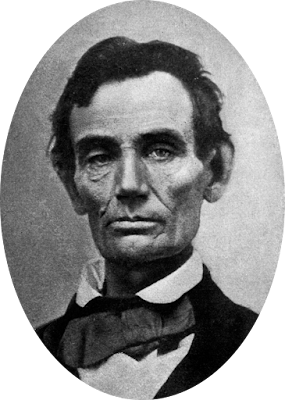There is more than one holiday for every darn day of the year. If you were listening to morning-drive-time-radio today, then you might have heard that it is National Fudge Day, or National Flip-Flop Day, or (at NPR) even Bloomsday. Any James Joyce fans out there?
But, as Toastmasters, we are all about public speaking. Thus we first celebrate that it is the 159th anniversary of Abraham Lincoln’s House Divided Speech.
The House Divided Speech
“Political newcomer Abraham Lincoln, beginning his campaign for the Illinois US senate seat, addressed the Republican state convention at Springfield Illinois and made a controversial speech that has become known as the House Divided speech. Attacking the Kansas-Nebraska Act of 1854, Lincoln said:
‘A house divided against itself cannot stand. I believe this government cannot endure, permanently half slave and half free. I do not expect the Union to be dissolved; I do not expect the house to fall; but I do expect it will cease to be divided. It will become all one thing, or all the other!’ ”
That description I just quoted from came right out of the 2016 edition of Chase’s Calendar of Events, which I blogged about on June 9th in a post titled June is Effective Communications Month, but somehow I didn’t get the message. It is an annual, 1-1/2’ thick, 8-1/2” by 11” $80 paperback reference book. This weighty tome is a conversation piece for victims of insomnia. But the reference desk at your friendly local public library probably has a copy. If you call them up, you might get a much better idea for a Toastmasters club meeting theme than from doing a quick Google search.
Of course, you also could got to Wikipedia and look up their page for June 16th. You will find lists of Events, Births, Deaths, and Holiday and observances. Much is boring stuff, like in 1903 the Ford Motor Company was incorporated, and in 1911 IBM was founded as the Computing-Tabulating-Recording Company. Birthdays include economist Adam Smith in 1723, Geronimo in 1829, and John Tukey in 1915. Tukey mashed up binary and digit into the trendy word bit.
National Fudge Day
The authoritative Oxford English Dictionary (OED) says as a verb fudge goes back to 1674, and it means to fit together or adjust in a clumsy, makeshift, or dishonest manner. As a noun it goes back to 1766 and means contemptible nonsense, a made-up story, a deceit, etc.
Fudge is a Victorian confection dating from 1889, described by a student at Vassar College. The Vassar fudge recipe became quite popular. Word spread to other women’s liberal art colleges in the Seven Sisters, like Wellesley and Smith.
Fudge is made by mixing sugar, butter, and milk, followed by heating it to the soft-ball stage at 240 F, and then beating the mixture while it cools so that it acquires a smooth, creamy consistency. Chocolate, nuts, and other flavors are sometimes added, either inside or on top. It is often bought from gift shops in tourist areas.
OED says another early 20th century meaning for fudge (as a noun) is a blank patch on a newspaper page - for example, the Daily Mail. It was set aside so especially late breaking news, like race results, can be inserted via a second press run - just for that outer page.
National Flip-Flop Day
Flip-flops are a type of inexpensive, waterproof two-piece sandal for casual wear. They consist of a flat sole (often foam) held loosely onto the foot by a Y-shaped strap that passes between the first and second toes and around both sides of the foot.
This style of footwear has been worn by the people of many cultures throughout the world, originating as early as the ancient Egyptians around 1500 BC. The modern flip-flop descends from the Japanese zori, which became popular in the US following World War II - when returning soldiers brought them back.
Flip-flop has been used in both in American and British English since the 1970s. It is an onomatopoeia of the sound made by the sandals when walking in them. In Austria they are called Schlapfen, and in Ghana the are called Charlie Wote. They also are somewhat xenophobically called Japonki in Poland, and Vietnamki in Russia. Flip-flop also refers to changing your opinion, as politicians commonly do.
Bloomsday
Bloomsday is named after Leopold Bloom, the central character in Jame Joyce’s 265,000 word long stream of consciousness novel, Ulysses. It takes place in Dublin on June 16, 1904. Why was that date chosen? Well, Joyce met his muse, Nora Barnacle, on June 10, 1904 in Dublin. Reportedly they had their first romantic liaison on June 16th. But they didn’t get married until 1931. That novel was published in Paris on February 2, 1922.
Throughout the 1920s, the U.S. Post Office burned copies of the novel as obscene. In 1933 Random House arranged to import the French edition and have a copy seized by U.S. Customs. The publisher contested the seizure in a lawsuit, affirmed in 1934 on appeal, so the U.S. became the first English-speaking country where the book was freely available.
Images of Abraham Lincoln, fudge, and Leopold Bloom all came from Wikimedia Commons.





No comments:
Post a Comment